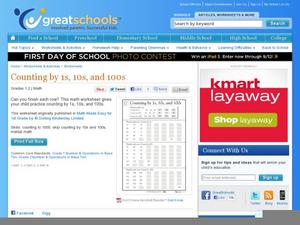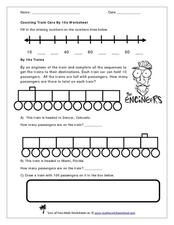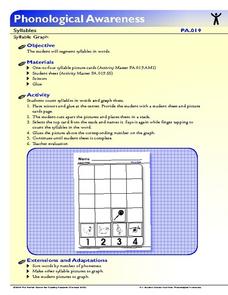Curated OER
Counting Out Loud
These number sequences are quite fun to look at! Beginning counters complete six of them as they say and write in the numbers. They count only by 1s, however some of these move from greatest to least. The highest number here is 20. Once...
Curated OER
Counting by 1s, 10s, and 100s
These sequences are missing numbers and require some skip counting to complete. Scholars finish rows of numbers first counting by 1s, then 10s, and finally 100s. Each has three given numbers to get them started, and they fill in five...
Curated OER
Counting Down
It's time for liftoff for these math rockets and the only way to get them into the sky is through the power of subtraction! Scholars begin with a double-digit number, subtracting numbers in a sequence to reach zero. There are four...
Curated OER
Counting by 10s
You've got their attention once candy is the focus of a math learning exercise! Learners count by 10 to determine how many candies are in each set, which are all grouped by 10. There is an example and number line to help them, and they...
Curated OER
Counting by 3s, 4s, and 5s
Skip count along the mushrooms to complete these number sentences which give young scholars an introductory look at addition and subtraction. Starting from five double-digit numbers, they subtract or add by threes, fours, and fives to...
Curated OER
Subtracting
Help kids visualize subtraction by assigning these sets of objects for them to subtract. They examine an example before completing the seven equations on their own. For each, learners cross out the subtrahend value and count the...
Curated OER
Counting by 2s, part 2
Two, four, six, eight...can your scholars count by twos? They fill in missing numbers in 18 number sequences, all of which require skip counting by twos. Some begin on an even number and others odd, however all of these are whole...
Curated OER
Writing Numbers
How many letters? Budding counters determine and record the number of letters in five messages trailing behind planes. The write down both the numeral and the word form; the highest number here is 19. Next, pupils fill in two blank...
Curated OER
What Shapes Can You See?
This clown is missing some things, and young counters sequence single-digit numbers to complete this juggling act. They connect four separate connect-the-dots sequences to create two triangles and two squares, then complete three more...
Curated OER
Count Off!
Twenty-two random numbers between 0-39 are posted in a list, and your class needs to identify them! While there is a word bank at the bottom, consider cutting it off before you copy the document and have your learners write the numbers...
Curated OER
Adding Up
Make addition visual in order to help beginners understand the concept. They add up beads on a string, examining an example before trying it on their own. Learners fill in addends and sums for these, and sometimes both. Although...
DK Publishing
3 Times Table
This 25-chart will give mathematicians a chance to detect patterns as they shade in every multiple of three by skip counting. They solve multiplication number sentences involving three and the numbers 1-5 (one is done for them.) Finally,...
Curated OER
Can You Count in Spanish?
Your young Spanish speakers are learning to count in Spanish. They count the objects in the right column and find the corresponding Spanish numbers. Only the numbers 1-10 are represented.
Curated OER
How Many?
Working with numbers 1-10, beginning counters complete five exercises to help them hone their skills. They examine two sets of sports balls, circling the ones at various number positions. Next, they count a set of ladybugs, recording the...
Curated OER
Counting Train Cars By 10s Worksheet
Counting on by 10 is a great way to prep learners for multiplication. Here are four practice problems that require youngsters to count by 10s up to 100.
Curated OER
Senior Analysis
A good review worksheet on simplifying rational expressions, solving equations with factorials, solving problems on permutations and combinations, and using the Binomial Theorem.
Curated OER
Counting to 100 (by 1s)
This hundreds chart is missing some numbers! Your scholars fill them in (92 are missing), and then they challenge themselves with a chart that looks a bit different. Using the same 10 x 10 layout, the second chart is filled with letters,...
Curated OER
Circle the Correct Amount Worksheet
Even though each of these sets of images has a number below it, the two may not match up! The challenge is to circle the number of objects matching the numeral in each box. Kids can either circle individual objects or draw a large circle...
Curated OER
Above, On, Below, part 2
Prepositions describe where something is in space or time. Little learners discover the prepositions about, on, and below. They locate and count objects in each position as they are located in relation to the ground. They then record the...
Curated OER
Above, On, and Below
This boating picture is missing a few things! Scholars practice common prepositions and counting as they add details to a scene. They follow specific directions by drawing two birds above the boat, three fish below it, and two ducks on...
Curated OER
Morning Math
Get your morning mathematicians thinking with this set of warm-ups. You can do them all in one day, or separate them and have kids do one each day. They will review past concepts and sharpen newer ones with this assortment of problems...
Florida Center for Reading Research
Phonological Awareness: Syllables, Syllable Graph
Scholars make a pictograph based on the number of syllables in each picture card. They choose a card, say the name of the object on the card, break the word into syllables, count the syllables, then glue the picture onto the number chart...
Florida Center for Reading Research
Phonological Awareness: Phoneme Segmenting, The Sound Game
Pre-readers get a better understanding of phoneme segmenting and counting by playing a board game. They pick an image card from the stack, say the name of the object, break the word down into segments, then move their piece that number...
Florida Center for Reading Research
Phonological Awareness: Syllables, Clapping Names
Scholars practice identifying and counting syllables. Images of classmates are cut out and placed on a chart. Learners clap and count the syllables in each child's name. They finish by writing the number of syllables under the...

























